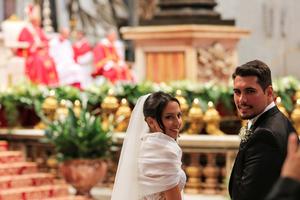Young, in Love — and at Risk of Mortal Sin
Perhaps Requiring Engaged Couples to Wait a Year or More to Marry Is an Undue Burden

On June 15, the Vatican released a 97-page document, “Catechumenal Itineraries for Married Life.” The document, which was published by the Dicastery for Laity, Family and Life, is a pastoral tool intended to help dioceses and pastoral staff develop effective marriage preparation programs that will lead couples to deeper love and a greater appreciation for God’s role in their family life.
This is good! The Church should be an influence in all areas of our lives — in education, at the job, in family life and in marriage. Married couples, Pope Francis said in the document, make up the majority of the Catholic faithful and are pillars in parish life. It’s only reasonable for the Church to strive to strengthen marriages and, ultimately, to strengthen families.
But here’s a potential problem: For young couples in love, the attraction and the drive toward full sexual union is significant. The cost of maintaining two separate residences is high, especially for young people just starting out. I worry that asking a young couple who have decided to marry and to spend their lives together to wait longer — apparently, more than a year longer — seems an imprudent course which puts them at risk for great sin. Either…
- they succumb to sexual temptation and begin a conjugal relationship even before the wedding; or
- they grow discouraged by the Church’s insistence that they wait, talking about the importance of a lifetime commitment and learning about it and attending weekly classes ad infinitum, postponing their union and their life together. Eventually, some may become so discouraged that they just slip out the door — and knock on the door of the Justice of the Peace or the door of the Protestant church down the street, where they’ll be welcomed and where they’ll be permitted to marry as quickly as they can arrange the caterer and mail the invitations.
The 12- or 15-month curriculum seems ideal for the parish staff, contained, as it were, in a binder or a hanging folder. But if I was one of those young people just lining up for the sacrament of Matrimony, this is what I’d like to see:
- Lots of preparation and advice before the marriage, sure. But perhaps for only a few months? Hopefully, it would be offered on an individual basis, by a director of family life or a long-married couple — someone in the parish with experience, knowledge and love. Of course, part of that preparation would include information about Natural Family Planning — what it is, how it works and how God invites us to embrace his divine will in our married life. Then,
- Optional continuing classes or counseling for those who have been married in the Church and who are now learning the ropes about daily love and about raising a family. For that matter, let’s not restrict it to only a year — let’s offer a kind of “marriage prep” for the long-married as well, because marriage is hard, even when it’s motivated by a deep love of God and the partner.
In the abbreviated form, marriage prep is more likely to be welcomed by the couple, and less likely to seem an imposition of control on a very personal decision. And relaxed marriage conversations, bringing together couples who are on different legs of their life journey together, can bear fruit in the marriage, the family and the parish.














